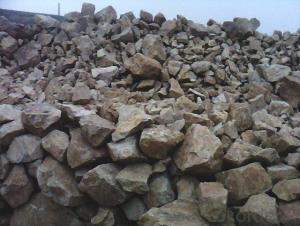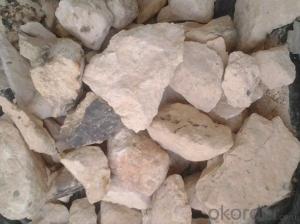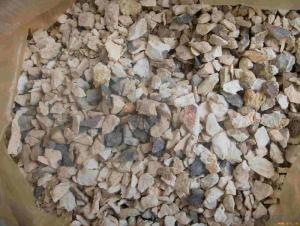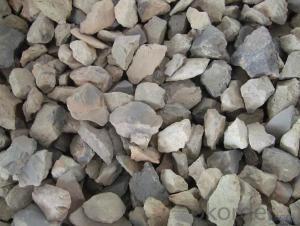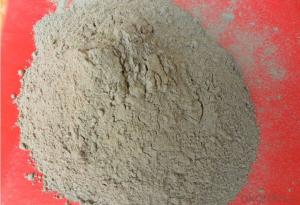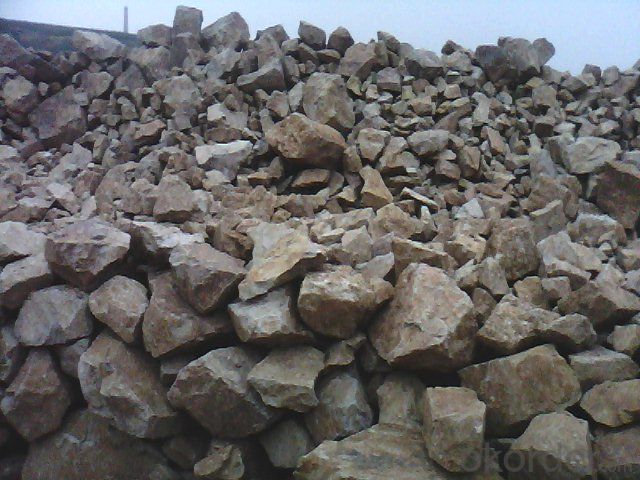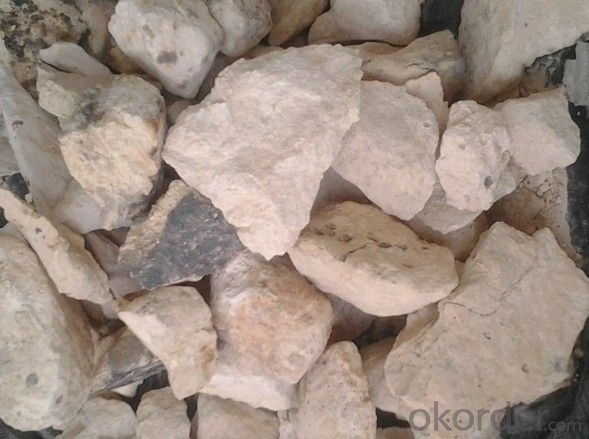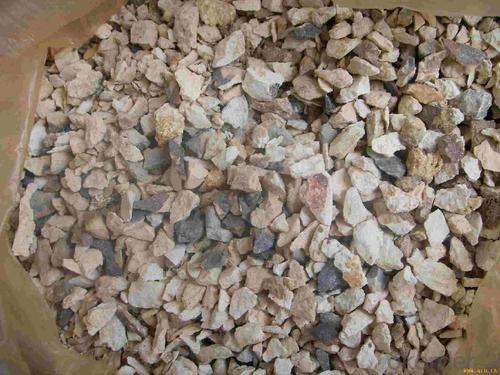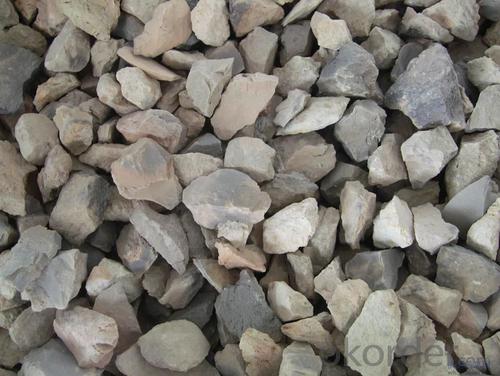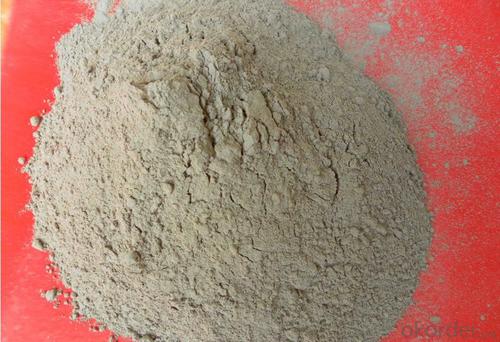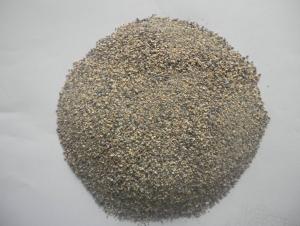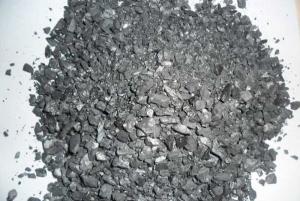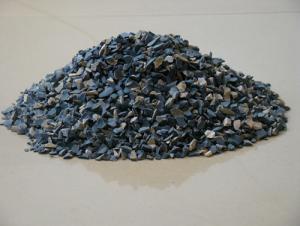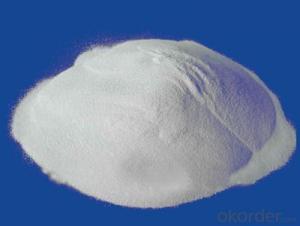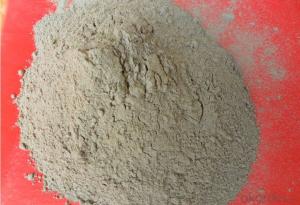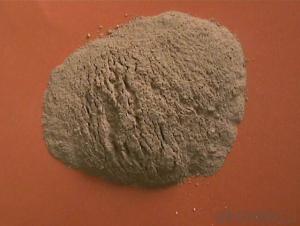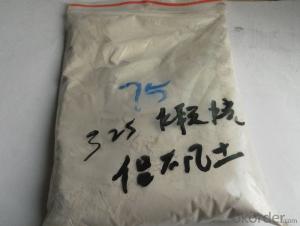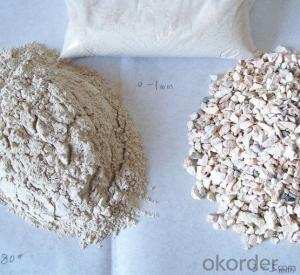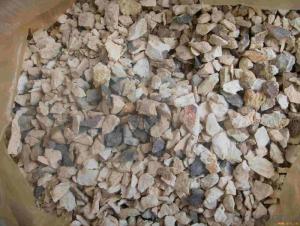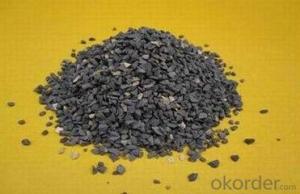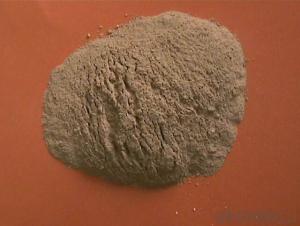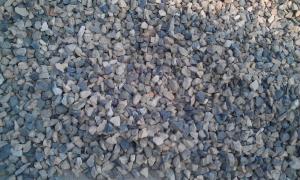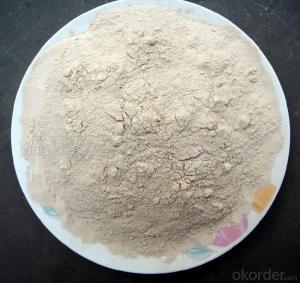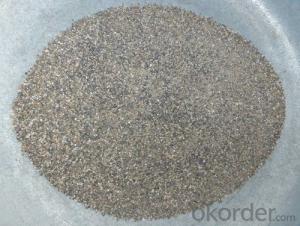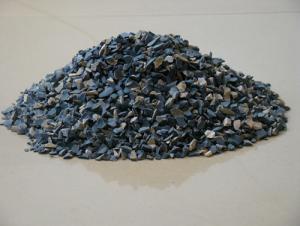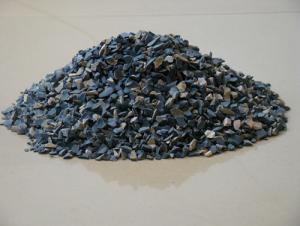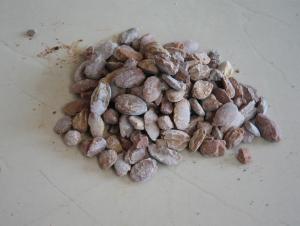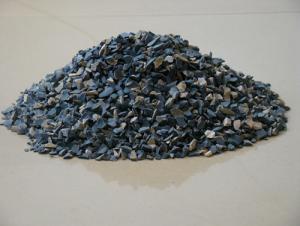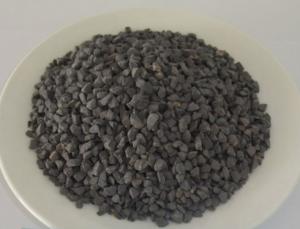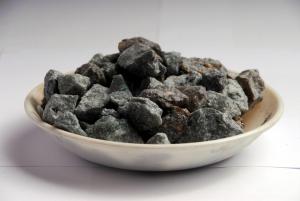Raw Materials for Refractory:China Natural Refractory Calcined Bauxite Low Price with Detailed Specifications
- Loading Port:
- Tianjin
- Payment Terms:
- TT OR LC
- Min Order Qty:
- 11 m.t.
- Supply Capability:
- 10000000 m.t./month
OKorder Service Pledge
OKorder Financial Service
You Might Also Like
1.Structure of Calcined Bauxite Description
Bauxite (aluminous soil; Bauxite) is also called the alumina or bauxite, main ingredients are alumina, hydrated alumina containing impurities, is an earthy mineral. White or gray, brown and yellow or light red by iron. From 4 to 3.9 g/cm3 density, hardness, 1 ~ 3 is not transparent, very brittle. Very difficult to melt. Insoluble in water, soluble in sulfuric acid, sodium hydroxide solution. Mainly used for aluminium, refractory material.
2.Main Features of the Calcined Bauxite
Calcined bauxite is one of the principal ore of aluminum. Calcined bauxite contains hydrous aluminum oxides and aluminum
hydroxides, formed through the laterization of aluminous rocks in tropical and subtropical areas .Calcined bauxite is obtained by calcining (heating)superior grade bauxite at high temperature (from 85OC to 1600C) .This removes moisture there. By increasing the alumina content,compared to an alumina content of about 57%to 58% in raw bauxite, calcined bauxite has an alumina content of 84%to88%.The heating is carried out in rotary kilns.
3.Main usage of the Calcined Bauxite
(1) aluminium industry. Used in national defense, aerospace, automotive, electronics, chemical industry, daily necessities, etc.
(2) precision casting. Alumina clinker made after the mould precision casting processed into fine powder. Used in military industry, aerospace, communications, instrumentation, machinery and medical equipment department.
(3) is used for refractory products. High bauxite clinker refractoriness is as high as 1780, chemical stability strong, and good physical properties.
(4) aluminum silicate refractory fiber. With light weight, high temperature resistance, good thermal stability, low thermal conductivity, heat capacity is small and the advantages of resistance to mechanical shock. Used in iron and steel, nonferrous metallurgy, electronics, petroleum, chemical, aerospace, atomic energy, defense and other industries.
(5) in magnesia and bauxite clinker as raw materials, add the appropriate binder, used for pouring ladle whole ladle lining has particularly good effects.
(6) manufacture alumina cement, abrasive materials, ceramic industry and chemical industry can be aluminum of various compound.
4. Calcined Bauxite Images
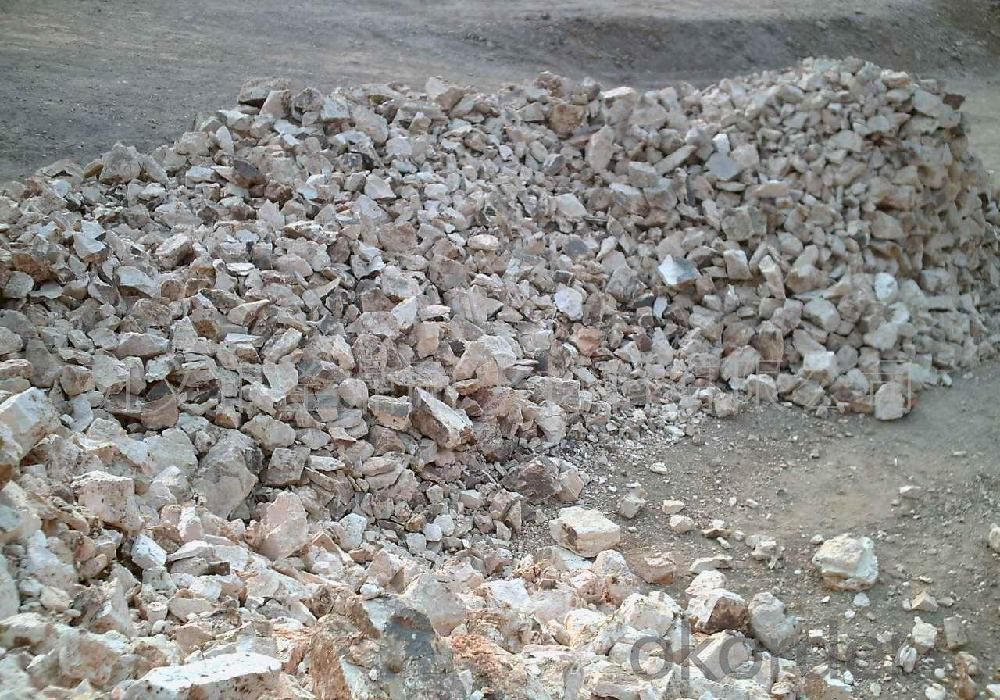
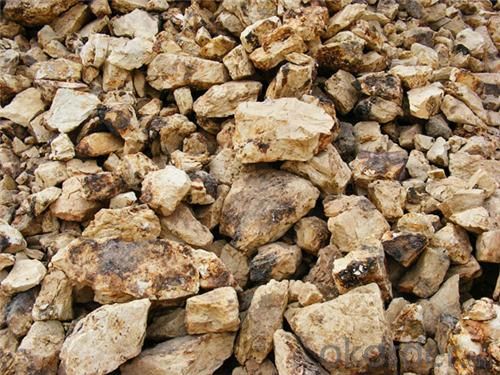
5. Calcined Bauxite Specification
Grade | AL2O3 | SIO2 | FE2O3 | TIO2 | K2O+Na2O | CaO+MgO | Bulk density |
HX75 | 75min | ≤17 | ≤3.0 | ≤4.0 | ≤0.3 | ≤0.5 | ≥2.70 |
HX80 | 80min | ≤12 | ≤3.0 | ≤4.0 | ≤0.3 | ≤0.5 | ≥2.80 |
HX85 | 85min | ≤8 | ≤2 | ≤4.0 | ≤0.3 | ≤0.5 | ≥3.00 |
HX86 | 86min | ≤7 | ≤2 | ≤4.0 | ≤0.3 | ≤0.5 | ≥3.10 |
HX87 | 87min | ≤6 | ≤2 | ≤4.0 | ≤0.3 | ≤0.5 | ≥3.20 |
HX88 | 88min | ≤5 | ≤1.8 | ≤4.0 | ≤0.25 | ≤0.5 | ≥3.25 |
HX90 | 90min | ≤3 | ≤1.8 | ≤4.0 | ≤0.25 | ≤0.5 | ≥3.3 |
Moisture(max) | 0.50% | ||||||
6.FAQ of Calcined Bauxite
1). Q: Are you a factory or trading company?
A: We are a factory.
2). Q: Where is your factory located? How can I visit there?
A: Our factory is located in ShanXi, HeNan, China. You are warmly welcomed to visit us!
3). Q: How can I get some samples?
A: Please connect me for samples
4). Q: Can the price be cheaper?
A: Of course, you will be offered a good discount for big amount.
- Q: Can anyone tell me what is A-leve fireproof material?
- What you say is probably palstic! B-level means the fireproof rating is at B1-level because palstic material doesn't belong to fireproof materials. It only is fire?retardant. When wholesaling all kinds of insulation materials and construction, it need tos look at the names. B1-level refers to the fire endurance rating of the fireproof material, which is determined according to the fire resistance of the material. In addition, different parts of the material have different fire endurance ratings! You can download a "Specifications of Fireproof Design for Buildings" for further information!
- Q: What are the meanings of azs, 34% and ec in fused brick?
- The fused brick, also called zircon corundum brick, is shorted as AZS for three chemical components in Al2O3-ZrO2-SiO2 ternary diagram. I don't know the meaning of EC.
- Q: I know which material is the fire resistance rolling shutter door
- Fire resistance rolling shutter door and ordinary roller shutter are basically same, the differences are: Its inner and outer sides are generally made of galvanized iron sheet, filling asbestos fireproofing material betwwen two layers of fire resistance rolling shutter door, and some fire shutter doors can be interlocked with the relevant fire control system, when the breaking out of fire , it can automatically "half-drop" and "full drop".
- Q: What's the maximum temperature that the refractory ceramic fiber cloth can endure?
- It depends on the composition of the ceramic material. If its composition is alumina and it is used by civilians, its normal use temperature is 1200℃; if its composition is alumina but it is for millitary use, it can endure the highest temperature of 2200℃.
- Q: Who knows the fire resistant level of the rock wool color plate?
- Hello; Same with other unprotected steel, the fire endurance of the color steel?plate is generally 15 minutes. It is not a fireproofing material, let alone fire resistant level. If the color steel plate has sprayed fire retardant coating and the thermal insulation filling material in the core is rock wool fiber, it can achieve A level fireproofing requirements. The color steel?plate refers to the painted steel plate, which is a steel plate with organic coating. The color steel board is divided into the single plate, color steel composite board, floor support board, ect. It is widely used in large public buildings, public plants, portable dwelling, and integrated housing walls and roofings. I hope that will help you.
- Q: How to determine the fire resistance rating of the aluminium-plastic?panel?
- Fire rating of the best aluminium-plastic?panel in the current market is B1 class, and its grade classifications can refer to the national standard. I have examined factories and tested the fireproof effect of the fire-proof plate myself by burning it, and I have found that the fire-proof plate of Jinwei Aluminium-plastic?Panel in Linyi is really good in quality and fire prevention. In other words, from the single point of fire rating, the corresponding fire rating of the called fireproof aluminum (plastic) composite panel should be at least B class, and for A2 class fireproof aluminum composite panel, its core material currently doesn't include plastic element, so it's called aluminum composite panel which is of inorganic core material. If the ordinary aluminum-plastic panel is classified according to the fire-proof building material, it will belong to that of lower level. For aluminum-pastic panel used in business premises, it is required to reach the grade of flame retardant material or above this in fire prevention. It is expressly stipulated that its fire rating should be A2 class in public places.
- Q: What refractories are accessible with ease in daily life? This material is suitable as a disposable mold and crucible for melting brass.
- The refractory that you want is high temperature furnace which you can buy from the market.
- Q: what needs to be noted when choosing and using blast furnace fireproof materials?
- it depends on the size of the blast furnace. below 200 cubic meters alumina bricks and carbon brickcan be used. 200 cubic meters and above are currently integrated bottom, not the same as the size of the cubic level, varying in the use of refactory. I hope my answers above are helpful to you and your ideal anwers.
- Q: what is the Specifications Grading for Fireproof rubber insulation materials ?
- At present, China Building Materials has two grading criteria for combustion performance. "Combustion Performance Classification Method of Building Materials" and "Combustion Performance Classification Method of Building Materials and Products" (GB8624-2006). Among them, one of the major changes of GB8624-2006 and GB8624-1997 is to divide the material combustion performance grading from homogenous material)Class A (composite sandwich material), B1, B2 and B3 level five minutes as A1, A2, B, C, D, E, F seven levels.
- Q: What refractory materials are used in power plant
- And then I will introduce some application of thermal material in power plant (below) I hope I can help you. Energy saving is the trend of future industrial development efforts, grinding machine, conveyor belt, so the production of light thermal insulation materials will gain state support, drying kiln. Our factory mainly produce light thermal insulation brick. The refractory material we use most is light insulation brick, and the equipment used is sand mixer (Luohe, Henan)
Send your message to us
Raw Materials for Refractory:China Natural Refractory Calcined Bauxite Low Price with Detailed Specifications
- Loading Port:
- Tianjin
- Payment Terms:
- TT OR LC
- Min Order Qty:
- 11 m.t.
- Supply Capability:
- 10000000 m.t./month
OKorder Service Pledge
OKorder Financial Service
Similar products
Hot products
Hot Searches
Related keywords
